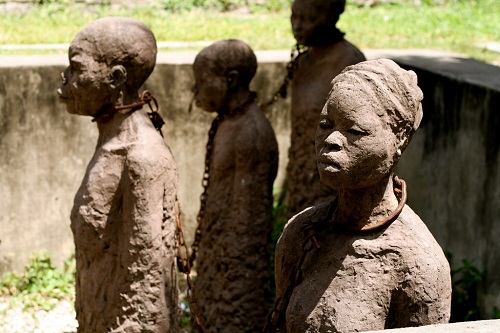flickr photo
By
Damiam Vincent Henry
Chains
Oh how they made us love these chains,
we wear them everyday.
Our boys are cuffed and pulled away.
We’ll never see a change.
Whether wearing them around our necks,
or close the gate at night.
We put them on our pitbulls just so
we can see them fight.
The story’s just beginning,
these young boys don’t know a thing…
They’ll never know the days our
ancestors were chained into a string,
then they were thrown in the sea
until they pulled each other down.
Oh how they fought against the ocean,
how they swallowed only water,
till the lot of them would drown.
And their souls arose to heaven,
staring down at them in chains.
That’s the story of our people,
a people who just love the chains,
they’re blinded by captivity,
and lack to see reality.
They’re homing pigeons flying,
such a lot they cannot be,
might seem as though they’re walking,
with no chains, they’re still not free.
Our children go to prison,
act like kings, but they are dying,
in those awful chains,
they’re not able to see.
Miseducation
I was taught to write poetry
not by man, nor educationally.
We never had the money;
spent most of what we had,
to feed each belly in our homestead.
Life was hard, but became not an excuse,
though our circumstances differed,
but our stories all related,
when written down; this pain became our muse
Our eyes drew energy from our surroundings,
and we used our struggle as inspiration.
Our words told a story the same as paintings,
defining who we were, despite our miseducation.
I was told to write poetry,
so our descendants may know our history,
so that our heritage may not be forsaken.
Immortalizing words already spoken.
Our voice when we’re no longer around.
We wrote because we loved creativity,
and this helped us even in times of captivity.
It was our cry when we couldn’t make a sound.
I was tempted to write poetry,
to express what it meant to be free.
The Necessary Death Of Kids?
As I lay in my bed,
I can’t help but feel bad that somewhere, sometime tonight…
A poor child will be dead.
There’ll be no justice;
It is something society will easily forget.
The streets will always be painted red,
and society will always show less care: thereupon people will continue enjoying the night.
The morning I’ll wake up,
and find the story in the papers
so as I’ll read, I’ll also discover a young girl kidnapped by some rapist.
See to where this tragedy had led, it could’ve been avoided, instead we became pusillanimous;
And for this we’ll always live in regret.
It’s a sadness that overwhelms my heart,
a tear in my eye,
And no words left to protect that which I so dearly love.
Do we give up?
Since we’ve left ourselves defenseless, for it seems we’re now the audience while the culprits became the entertainers.
We have to make a start,
the tears will only dry.
What remains of us when we’re thus unable to ask help from above?
Is the death of kids really necessary?
Damiam Vincent Henry
I became a writer and poet the day my mother named me. I was born Damiam Vincent Henry in the very streets of Cape Town. Being a young male, growing up in the Cape Flats I had my reading. I read all types of books, from Map Jacobs to Moby Dick. Swept away into a world free from poverty and institutionalization, I’m reminded coming from school and immediately getting lost in the comic book titled “Coloureds” written by the Trantraal Brothers. Reading became my hope. It inspired me to write. But imagine seeing people addicted to drugs, girls forced into prostitution, and boys inducted into the number game. Motherless children who hadn’t eaten for three whole days, wearing those same clothes they wore a few days ago. These are a few of the many things my eyes had witnessed; although this happens everywhere.
We fought our battles from being bullied at school, making new friends, and vaguely hating our lives. But we’d never truly know how our mother would do char jobs just to keep us in school. Or how she starved herself so that we wouldn’t attend school hungry; many mothers can relate. But growing up and later moving to Delft, our mother became even more protective over my brothers and I…who could blame her? We’ve lived just about everywhere and even though we pretended getting used to the idea of staying in one place, we thought life was cruel.
But our mother had an antidote to escaping from the “cruel life.” Funny, she’d give each of us a Huisgenoot while attending to the people’s washing, and doing dishes. And we’d be lost in “Liewe Heksie” and trying to complete the crossword puzzle. She had her eye on us even when it seemed she was pre-occupied. Now, residing in Stellenbosch and being away from my mother’s home…I’m reminded by her words she’d always quote: “A mother’s work is never done.” And now being a father of two, understanding what she meant after all this time, I dreamt of changing the Cape Flats but it never crossed my mind that our entire world needed fixing.
As one of my role models said: “Wishing for the impossible is a flat stone skipping across water, bouncing off the surface, countless times before sinking.” Yes, failure is inevitable, but literature will always be beautiful. My mother stood firm in her beliefs that we represent God wherever we go, and now being in Stellenbosch, today I’m 26 years old and am hoping to do so through my writing.



No Comments Yet!
You can be first to comment this post!